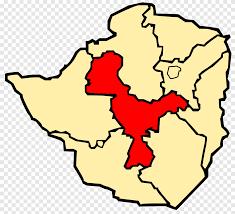News / National
Zanu-PF wants to rename Zimbabwe's provinces
30 Oct 2024 at 08:01hrs |
0 Views

The ruling Zanu-PF party has called for the renaming of Zimbabwe's provinces, aiming to eliminate colonial-era names that have historically fueled division among the population. This resolution emerged from the party's 21st Annual National People's Conference, which concluded in Bulawayo on Saturday.
Zanu-PF officials expect that the decisions made during the conference will be swiftly implemented by various government departments and agencies. In a strategic move to ensure alignment with government planning, the party has scheduled its conference prior to the announcement of the national budget for the upcoming year.
Under the theme "Industrialise and Modernise Towards the Attainment of Vision 2030," the conference sought to bolster the national development agenda laid out by President Emmerson Mnangagwa. Presenting the resolutions, Zanu-PF Secretary for Legal Affairs Patrick Chinamasa emphasized the need to enhance national unity through the renaming initiative.
"On liberation war heritage, the party directs the Government to accelerate the renaming of provinces and do away with colonial names, which divide the nation," stated Chinamasa.
Historians and cultural commentators have praised this resolution as a long-overdue step toward healing the nation's historical wounds. Mr. Methembe Hadebe, a prominent historian, remarked, "The naming of the provinces was part of the colonialists' divide and rule tactics. Changing the names of the provinces will foster national pride and promote a sense of belonging among Zimbabweans."
He added that renaming the provinces should be complemented by a comprehensive review of the national educational curriculum to rectify historical misconceptions.
Colonial authorities named provinces along ethnic lines, with the southern regions designated as Matabeleland, primarily populated by Ndebele-speaking individuals, while the northern regions were referred to as Mashonaland, reflecting the dominance of Shona ethnic groups. The eastern part of the country was named Manicaland, derived from the Manyika people. Mr. Hadebe emphasized that this colonial naming practice contradicted the spirit of national unity.
In addition to the renaming initiative, Chinamasa highlighted the need for the government to refurbish and maintain all national heroes' shrines across provinces and districts as a means to honor the country's liberation struggle. He urged the government to expedite the vetting of outstanding war veterans and ensure timely gratuity payments.
"The party directs the Government to prioritize the disbursement of resources for exhumations and re-burials of veterans of the liberation struggle," Chinamasa said, also advocating for protections for veterans against land evictions and local authority developments that might affect them.
Furthermore, the party has proposed the establishment of provincial museums dedicated to preserving the memories of the liberation struggle and the erection of statues honoring national heroes throughout the provinces.
Zanu-PF has also reaffirmed its commitment to engaging the British government to fulfill its promise of financial compensation to former white commercial farmers, even as the Zimbabwean government has committed to pay US$3.5 billion for improvements made on farms under the Global Compensation Deed.
As Zimbabwe continues to navigate its post-colonial identity, the resolutions from the Zanu-PF conference signal a significant move toward embracing national unity and heritage while addressing the remnants of colonial influence in the country.
Zanu-PF officials expect that the decisions made during the conference will be swiftly implemented by various government departments and agencies. In a strategic move to ensure alignment with government planning, the party has scheduled its conference prior to the announcement of the national budget for the upcoming year.
Under the theme "Industrialise and Modernise Towards the Attainment of Vision 2030," the conference sought to bolster the national development agenda laid out by President Emmerson Mnangagwa. Presenting the resolutions, Zanu-PF Secretary for Legal Affairs Patrick Chinamasa emphasized the need to enhance national unity through the renaming initiative.
"On liberation war heritage, the party directs the Government to accelerate the renaming of provinces and do away with colonial names, which divide the nation," stated Chinamasa.
Historians and cultural commentators have praised this resolution as a long-overdue step toward healing the nation's historical wounds. Mr. Methembe Hadebe, a prominent historian, remarked, "The naming of the provinces was part of the colonialists' divide and rule tactics. Changing the names of the provinces will foster national pride and promote a sense of belonging among Zimbabweans."
He added that renaming the provinces should be complemented by a comprehensive review of the national educational curriculum to rectify historical misconceptions.
Colonial authorities named provinces along ethnic lines, with the southern regions designated as Matabeleland, primarily populated by Ndebele-speaking individuals, while the northern regions were referred to as Mashonaland, reflecting the dominance of Shona ethnic groups. The eastern part of the country was named Manicaland, derived from the Manyika people. Mr. Hadebe emphasized that this colonial naming practice contradicted the spirit of national unity.
In addition to the renaming initiative, Chinamasa highlighted the need for the government to refurbish and maintain all national heroes' shrines across provinces and districts as a means to honor the country's liberation struggle. He urged the government to expedite the vetting of outstanding war veterans and ensure timely gratuity payments.
"The party directs the Government to prioritize the disbursement of resources for exhumations and re-burials of veterans of the liberation struggle," Chinamasa said, also advocating for protections for veterans against land evictions and local authority developments that might affect them.
Furthermore, the party has proposed the establishment of provincial museums dedicated to preserving the memories of the liberation struggle and the erection of statues honoring national heroes throughout the provinces.
Zanu-PF has also reaffirmed its commitment to engaging the British government to fulfill its promise of financial compensation to former white commercial farmers, even as the Zimbabwean government has committed to pay US$3.5 billion for improvements made on farms under the Global Compensation Deed.
As Zimbabwe continues to navigate its post-colonial identity, the resolutions from the Zanu-PF conference signal a significant move toward embracing national unity and heritage while addressing the remnants of colonial influence in the country.
Source - the chroncile
Join the discussion
Loading comments…
































